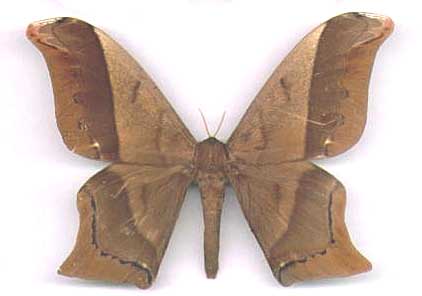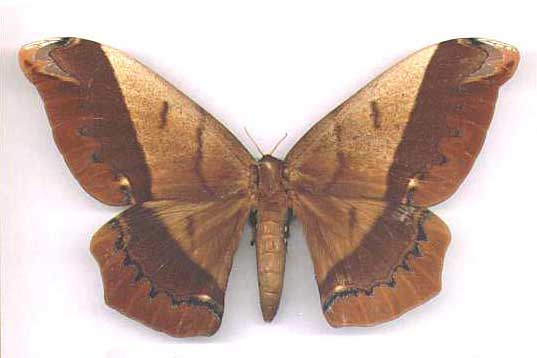Arsenura delormei
Ar-sen-OOR-uhmmduh-LOORM-eye
Bouvier, 1929

Arsenura delormei moth (male) courtesy of Thibaud Decaens.
TAXONOMY:Superfamily: Bombycoidea, Latreille, 1802 |
"The Girl from Ipanema"
midi by Mel WebbON.OFF |
DISTRIBUTION:
TheArsenura delormei moth (Wingspan: males: 115mm-150mm; females: 126-140mm) flies in the South East of the Andean Cordillera (from Peru: Junin, Cuzco and Puno to Bolivia: Cochabamba and probably La Paz) at low elevations (200-1200 m).
The genitalia of delormei and beebei do not differ, but the forewing median band of delormei is not outwardly bent near the inner margin as it is in beebei.
FLIGHT TIMES AND PREFERRED FOOD PLANTS:
There are probably at least two generations of Arsenura delormei on the wing each year probably from January to February and in July. Moths prefer a light rain and are on the wing from 12:10-3:30 am.
Foodplants are unknown.

Arsenura delormei moth (female) courtesy of Thibaud Decaens.
ECLOSION, SCENTING AND MATING:
Arsenurini males use their antennae to seek out females which
scent at night. The lower wings of the female (above) are much more rounded than those of the male. Females also tend to be much larger than males.
EGGS, LARVAE AND PUPAE:
Larvae descend tree
trunks at maturity to pupate in subterranean chambers.
Larval Food Plants
It is hoped that this alphabetical listing followed by the common
name of the foodplant will prove useful. The list is not exhaustive.
Experimenting with closely related foodplants is worthwhile.
Larval Food Plants
It is hoped that this alphabetical listing followed by the common name of the foodplant will prove useful. The list is not exhaustive. Experimenting with closely related foodplants is worthwhile.
Some of the early describers/namers chose genus
and species names indicating some character of the insect, but more
often, they simply chose names from Greek or Roman mythology or
history. Those species names which end in "ensis" indicate a
specimen locale, and those which end in "i", pronounced "eye", honour
a contempory friend/collector/etc.
I do not know the source of the genus
name "Arsenura" chosen by Duncan in 1841.
The species name is honourific for Delorme.
Use your browser "Back" button to return to the previous page.
Return to Arsenura Genus
Return to Main Index